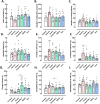Oral andrographolide loaded lipid nanocarriers alleviate stress behaviors and hippocampal damage in TNF alpha induced neuroinflammatory mice
- PMID: 40200039
- PMCID: PMC11978996
- DOI: 10.1038/s41598-025-96758-1
Oral andrographolide loaded lipid nanocarriers alleviate stress behaviors and hippocampal damage in TNF alpha induced neuroinflammatory mice
Abstract
This study aimed to improve the delivery efficacy of andrographolide (Andro) by encapsulating it in nanostructured lipid carriers (NLCs) and to evaluate its effectiveness in reducing systemic inflammation. These AndroNLCs exhibited homogeneity with a particle size of 131.40 ± 1.30 nm and approximately 89% encapsulation efficiency. AndroNLCs potentially enhanced oral efficacy by improving gastrointestinal stability, with reduced toxicity and inflammation in SH-SY5Y neuroblastoma cells. Inflammation was induced in sexually active C57BL/6 male mice with five intraperitoneal doses of 63 µg/kg TNF-alpha every three days. This was accompanied by daily oral administration of 10 mg/kg AndroNLCs, venlafaxine, or 1 mg/kg dexamethasone for 14 days. Mice with TNF-alpha-induced inflammation showed sickness signs and abnormal behaviors, assessed via physical changes, anxiety and depression tests (i.e., open field, elevated-T maze, tail suspension, and forced swimming), and biochemical assays. These changes included weight loss and compensatory responses to inflammation, as indicated by increased immune- and stress-modulated organ weights, elevated serum corticosterone levels, altered liver function markers, and higher levels of hippocampal IL-6 and TNF-alpha. Furthermore, histological analysis showed pyknotic cells, reduced layer thickness, and decreased hippocampal cell survival. Conversely, AndroNLCs significantly improved stress- and inflammation-related markers, alleviated behavioral abnormalities, reduced liver toxicity, and restored hippocampal morphology, showing effects greater than Andro alone and comparable to traditional treatments. These findings suggest that AndroNLCs have therapeutic effects on neuroinflammation but may risk contributing to mood disorders.
Keywords: Andrographolide; Inflammation; Nanostructured lipid carrier; Stress; TNF-alpha.
© 2025. The Author(s).
Conflict of interest statement
Declarations. Competing interests: The authors declare no competing interests. Ethics statement: The experimental procedures were approved by the Institutional Animal Care and Use Committee of Thammasat University, Pathum Thani, Thailand (project number 21-2021, renewed in 2024). The study was conducted in compliance with the ARRIVE guidelines ( https://arriveguidelines.org ).
Figures






References
MeSH terms
Substances
Grants and funding
LinkOut - more resources
Full Text Sources

